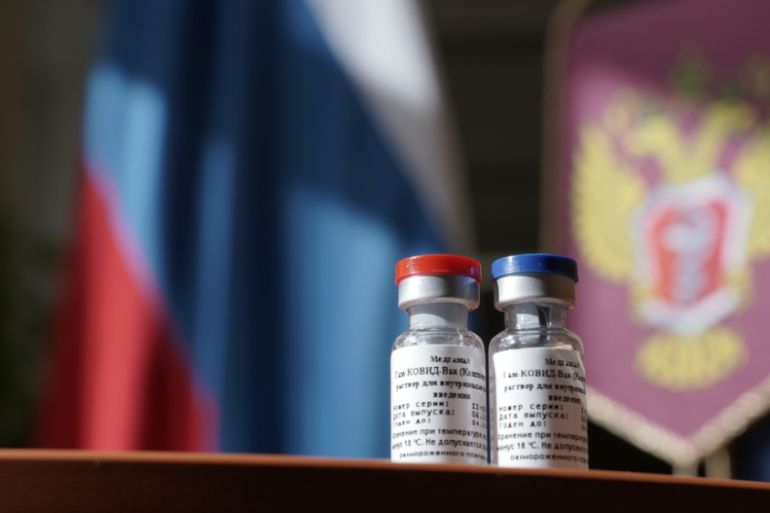Sputnik V: What we know about Russia’s coronavirus vaccine
Russia, the first country to grant approval for a COVID-19 vaccine, started to release the first batch to the public.

Russia has begun releasing its coronavirus vaccine, Sputnik V, to the general public as developers prepare to conduct large-scale clinical trials while administering the shot to civilians.
“The first batch of the Gam-COVID-Vac (Sputnik V) vaccine … passed the needed quality tests … and was released into civil circulation,” the Health Ministry said in a statement on Tuesday, adding that regional distribution will start in the near future.
Keep reading
list of 4 itemsMexico’s teachers seek relief from pandemic-era spike in school robberies
‘A bad chapter’: Tracing the origins of Ecuador’s rise in gang violence
Why is the US economy so resilient?
President Vladimir Putin’s announcement on August 13 that Russia had become the first country to grant regulatory approval to a COVID-19 vaccine raised scepticism.
The Sputnik V – in homage to the world’s first satellite launched by the Soviet Union – has not yet completed its phase-three trial, which involves wide-scale testing with thousands of participants.
To respond to critics, Moscow hailed at results published on Friday by the Lancet medical journal showing that the vaccine produced an antibody response in all participants and no serious side effects. The study was conducted in June-July and involved 76 people.
Across the globe, more than 200 vaccine candidates are being developed and trialled, with at least 24 in the human clinical trial phase, according to the World Health Organization (WHO).
Here is what we know so far about Russia’s vaccine:
What is Sputnik V?
The “Sputnik V” is a vaccine developed by the Gamaleya research institute in coordination with the Russian defence ministry. It is based on a proven vaccine against adenovirus – the common cold.
The vaccine is expected to provide immunity from SARS-CoV-2, the virus that causes COVID-19, for up to two years, according to the Russian health ministry. But the results of the limited trials have yet to be made public.
The vaccine is administered in two doses and consists of two serotypes of human adenovirus, each carrying an S-antigen of the new coronavirus, which enter human cells and produce an immune response.
It is a so-called viral vector vaccine, meaning it employs another virus to carry the DNA encoding of the needed immune response into cells.
|
|
The platform used for the vaccine was developed by Russian scientists over 20 years and had formed the basis for several vaccines in the past, including those against Ebola.
Gamaleya’s vaccine is based on similar technology to the coronavirus vaccine prototype developed by CanSino, a Chinese vaccine-making company.
The vaccine could be available for mass use in October, according to the country’s health ministry.
What is the world’s reaction?
While numerous experts and governments have raised concerns that Russia is racing to be the first with an approved vaccine and compromising safety, some countries have shown interest in Sputnik V.
The WHO said it was looking forward to reviewing the clinical trials.
Scientists in Russia and elsewhere have questioned the speed of the development and lack of transparency, saying offering the vaccine to the public before the important final-stage testing could pose serious problems.
“We have no idea that the claims that are being made about the safety and immune response of this virus are true or not,” Peter Drobac, infectious disease medic at Oxford University, told Al Jazeera.
He said the “geopolitics – being able to claim victory – may put pressure on other countries to cut corners on safety and effectiveness as well. That could put all in danger”.
Meanwhile, the Philippines plans to start trialling the vaccine in October, with President Rodrigo Duterte expected to be inoculated as early as May next year, the presidential spokesman said on Thursday.
A Brazilian technology institute said on Wednesday it expected to produce the controversial vaccine by the second half of 2021, shortly after the state of Parana signed a memorandum of understanding with Moscow.